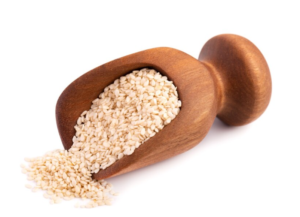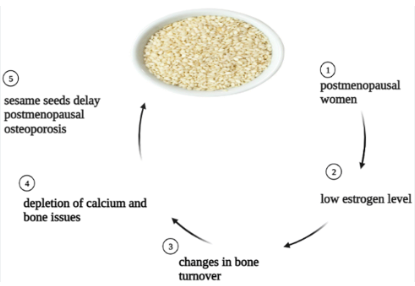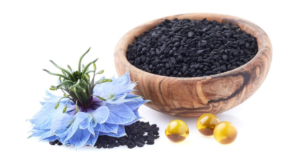Introduction
Sesame seeds, small yet powerful seeds from the Sesamum indicum plant, have long been prized in various cultures for their impressive health benefits. Packed with vital nutrients, these tiny seeds play a huge role in promoting overall wellness, especially when it comes to skin health and bone strength.
Table of Contents
Nutritional Profile of Sesame Seeds
The nutrient density of sesame seeds is remarkable. They are rich in essential vitamins, minerals, and beneficial fatty acids that support various bodily functions.
1. Key Vitamins and Minerals in Sesame Seeds

Sesame seeds contain an array of vital nutrients, including calcium, magnesium, zinc, and vitamin E. Each of these nutrients plays a crucial role in maintaining skin elasticity, bone density, and general cellular health.
2. Sesame Seeds and Their High Calcium Content
High calcium content is one of the most defining characteristics of sesame seeds. Calcium is a primary component of bone health and development, making sesame seeds an excellent option for those looking to strengthen their bones naturally.
Benefits of Sesame Seeds for Skin Health
Adding sesame seeds to your diet may improve skin health in multiple ways. These benefits are derived from a unique blend of antioxidants, vitamins, and oils.
1. How Sesame Seeds Promote Glowing Skin
Rich in vitamin E and antioxidants, sesame seeds help fight free radicals, which cause premature aging and skin dullness. Regular consumption or application of sesame seed oil can lead to a more vibrant, youthful complexion.

2. Sesame Oil vs. Sesame Seeds: What’s Best for Skin?
While sesame seeds are great for consumption, sesame oil is often used directly on the skin. This oil can be used for topical application to nourish the skin, reduce dryness, and add a natural glow.
Benefits of Sesame Seeds for Bone Health
The bone-strengthening effects of sesame seeds come from their high mineral content, especially calcium and magnesium.
1. Calcium and Magnesium: Building Blocks of Strong Bones
Calcium, coupled with magnesium, helps improve bone density and reduces the risk of bone-related disorders such as osteoporosis. This makes sesame seeds an easy dietary addition for boosting bone health.

2. Case Study: Real Results from Sesame Seed Consumption
A study from [Journal Source] examined the effects of daily sesame seed consumption on bone density in older adults. The results showed improved bone density and decreased joint pain, highlighting sesame seeds’ potential as a natural supplement for bone health.
Other Health Benefits of Sesame Seeds
Beyond skin and bone health, sesame seeds offer additional benefits that contribute to overall wellness.
1. Sesame Seeds for Heart Health
High in heart-healthy fats and antioxidants, sesame seeds can help improve cardiovascular function and reduce the risk of heart disease.
2. Role of Sesame Seeds in Hormone Balance
Sesame seeds contain lignans, compounds that may help balance hormones, particularly in women. Regular consumption may reduce symptoms related to hormonal imbalance.
Some ways to incorporate sesame seeds into your diet
Incorporating sesame seeds into your diet is easy, and they can be used in a variety of delicious ways.
1. Cooking with Sesame Seeds: Simple Recipes
Sprinkling sesame seeds over salads, adding them to smoothies, or using them in baking are simple yet effective ways to benefit from their nutrients.
2. Sesame Seed Supplements: Are They Worth It?
For those who may not enjoy the taste of sesame seeds, supplements offer a convenient alternative. However, whole seeds may provide additional fiber and nutrients.
Sesame Seeds: A Versatile Addition for Improved Health
Adding sesame seeds to your diet is a small change with big benefits. Their versatility makes them easy to incorporate into different meals, and you can enjoy them raw, toasted, ground, or in oil form.
1. Sesame Seeds in Asian Cuisine

Sesame seeds have a prominent place in Asian cuisine, where they’re added to stir-fries, rice dishes, sushi, and even desserts. Toasting the seeds enhances their flavor, making them a delicious topping for many dishes.
2. Smoothies, Salads, and Soups
For a quick nutritional boost, sprinkle sesame seeds over salads, blend them into smoothies, or add them as a garnish to soups. The crunchy nuts add a satisfying crunch while also enhancing the flavor.
3. Tahini: A Nutritious Sesame Paste
Tahini, a paste made from ground sesame seeds, is commonly used in Mediterranean and Middle Eastern cuisine. Rich in flavor and nutrients, tahini can be spread on toast, added to hummus, or used as a dressing base for salads. It’s an excellent way to get all the benefits of sesame seeds in a creamy, versatile form.
Tips for Storing Sesame Seeds
To preserve the freshness and nutrient quality of sesame seeds, it’s essential to store them properly. Here are a few storage tips:
1. Use an Airtight Container
Keep sesame seeds in an airtight container to prevent them from absorbing moisture and other odors from your pantry.
2. Refrigerate for Longevity
Sesame seeds can last up to a year when stored in the refrigerator. This keeps them fresh and preserves their nutrient content.

3. Freeze for Extended Freshness
For even longer storage, consider freezing sesame seeds. Freezing them will extend their shelf life by two years.
Conclusion
Sesame seeds are more than just a tasty topping; they’re a powerhouse of nutrients that offer a wide range of health benefits. From promoting glowing skin to strengthening bones, sesame seeds are an easy addition to a balanced diet. With their rich content of calcium, magnesium, and antioxidants, these tiny seeds can have a substantial impact on your overall well-being.
Frequently Asked Questions (FAQs)
Yes, sesame seeds are rich in fiber and healthy fats, which can help manage weight by promoting satiety.
Sesame seeds are rich in essential nutrients that support hair growth and strength.
Typically, 1-2 tablespoons a day is enough to reap the health benefits.
Black sesame seeds are slightly higher in antioxidants compared to white sesame seeds.
Yes, eating them on an empty stomach is safe and can enhance nutrient absorption.
Sesame seeds are generally safe for people with nut allergies, but consult a doctor to be sure.
Hulled seeds have their outer layer removed, while unhulled seeds retain more fiber and nutrients.
Yes, their high magnesium content may help alleviate joint pain and improve bone health.
Stored properly, sesame seeds can remain fresh for up to a year.
The key is moderation; excessive consumption may cause digestive discomfort.

10 Proven Benefits of Bananas for Health and Well-being
Bananas are known for their natural sweetness, ease of peeling and rich nutrition. This makes them one of the most commonly consumed fruits in the world. Though bananas originated in Southeast Asia, they are now

Disease X: The Next Pandemic?
Emerging infectious diseases pose one of the greatest threats to human health and global stability. One of them, “Disease X” has intrigued scientists and WHO, as it represents the potential for an unknown disease to

The Remarkable Benefits of Eating Acorn Squash in Winter
Acorn squash has all the qualities that make it special. Winter calls for warmth, comfort, and nutrition, and acorn squash provides all of these. This vegetable is not just delicious but also has a lot

Omega-3 Fatty Acids
Omega-3 fatty acids play a very important role in the nutrients needed to maintain overall health. As people are getting to know about it, its popularity is increasing day-by-day. These fats play a very important



